SBA Real Estate Loans: Uses, Rates and How to Qualify
SBA 7(a) and 504 loans can both be used to finance commercial real estate. Compare options to find the right fit for your business.

Many, or all, of the products featured on this page are from our advertising partners who compensate us when you take certain actions on our website or click to take an action on their website. However, this does not influence our evaluations. Our opinions are our own. Here is a list of our partners and here's how we make money.
Concerned about tariffs?
Many small-business owners are under increased economic stress and uncertainty following the latest tariff announcements. NerdWallet is here to help you find answers for whatever you're looking for. Here are some resources to help you get started:
Need emergency funding? Consider a business line of credit.
Looking for fast access to working capital? Discover the best working capital loans.
Want tips on how to mitigate the impact of tariffs? Read our guide.
The Small Business Administration (SBA) offers 504 and 7(a) loans that can be used to purchase real estate, as well as construct new facilities, renovate existing buildings and make land improvements.
These small-business loans have long repayment terms and competitive interest rates, but you’ll need strong credentials to qualify. You may also have to meet real estate-specific criteria, such as owner-occupancy requirements.
SBA real estate loans are offered by banks, credit unions and other lenders such as Certified Development Companies (CDCs).
How much do you need?
We’ll start with a brief questionnaire to better understand the unique needs of your business.
Once we uncover your personalized matches, our team will consult you on the process moving forward.
Types of SBA real estate loans
There isn’t a dedicated SBA commercial real estate loan program offered by the Small Business Administration. Instead, SBA real estate loans are offered through the 504 and 7(a) loan programs. SBA microloans cannot be used for real estate purchases.
Although SBA 504 and 7(a) loans share similarities, each offers its own advantages for financing your commercial real estate project.
SBA 504 loans
SBA 504 loans, also known as CDC/504 loans, are designed specifically for large equipment and real estate-related purchases. These loans come from three parties:
A Certified Development Company (40%).
A third-party lender, like a bank or credit union (50%).
The borrower (10%).
If you’re a new business and/or using your loan for what the U.S. Small Business Administration deems a “special purpose property,” you may have to put down a larger down payment of 15% or 20%, depending on the project. The SBA will provide a 100% guarantee on the CDC portion of the loan.
Use cases
SBA 504 loans can provide funding for:
Land or building purchases.
Land improvements, such as adding curbs, gutters or parking lots.
Building improvements, such as changing the exterior or updating electrical systems.
Equipment and machinery purchases.
Debt refinancing (in certain scenarios).
SBA 504 loans cannot be used for working capital or inventory purchases. 504 loan projects must also meet job creation or public policy goals as laid out by the SBA.
Rates and terms
On the CDC portion of the loan, SBA 504 loans are usually available in amounts up to $5 million, although some projects may be eligible for up to $5.5 million. The SBA does not impose a maximum funding amount for the entire 504 loan project. Repayment terms on real estate uses can be either 20 or 25 years, whereas equipment purchases only have terms up to 10 years.
Interest rates on these SBA real estate loans are based on both the CDC and bank portion of the loan. The bank portion can have a fixed or variable interest rate that will vary based on your lender and business qualifications. However, this rate is subject to a maximum set by the SBA.
Interest rates on the CDC portion of the loan are tied to five- and 10-year U.S. Treasury notes and typically range from 5% to 7%.
» MORE: Best hotel financing options
SBA 7(a) loans
The most popular type of SBA loan, 7(a) loans can be used for a variety of purposes, including real estate improvements and purchases. Unlike 504 loans, SBA 7(a) loans are issued solely by participating lenders, usually banks and credit unions. These loans are partially guaranteed by the SBA — up to 85% for loans of $150,000 or less and up to 75% for loans above $150,000.
Use cases
You can use the capital from an SBA 7(a) loan to fund:
Land purchases or leases.
Street, parking lot or landscaping improvements.
Building purchases, expansions or renovations.
New building construction.
Equipment purchases.
Inventory purchases.
Working capital.
Debt refinancing (in certain scenarios).
Rates and terms
SBA 7(a) loans are available in amounts up to $5 million; however, the average loan amount in fiscal year 2023 was $479,685. Repayment terms are up to 25 years for real estate loans, and up to 10 years for equipment, working capital and inventory loans.
Interest rates on 7(a) loans are set based on the prime rate, plus a spread that is negotiated between you and your SBA lender. This spread is subject to SBA maximums, which vary based on your loan size and term length.
Currently, SBA 7(a) loan rates range from 10.5% to 14%.
» MORE: Current SBA loan rates
Differences between SBA 504 and 7(a) loans
Although 504 and 7(a) loans can both be used as SBA real estate loans, the 504 loan can offer lower interest rates and larger potential loan amounts, whereas the 7(a) loan has more flexible use cases and doesn’t require you to meet job creation or community development goals.
Here are some of the important differences between these options.
Side-by-side comparison of SBA 504 and 7(a) loans
SBA 504 loan | SBA 7(a) loan | |
|---|---|---|
Loan amounts | On the CDC portion of the loan, up to $5 million, or $5.5 million for certain energy projects; no maximum limit on total project funding. | Up to $5 million. |
Interest rates | Typically range from 5% to 7%. (Based on CDC and bank portion of the loan.) | Currently range from 10.5% to 14%. (Varies based on lender and your qualifications, subject to SBA maximums.) |
Repayment terms | Up to 25 years for real estate purposes. | Up to 25 years for real estate purposes. |
Down payment | 10% to 20% or more. | 10% or more. |
Structure | Financing comes from three different sources:
| 100% of financing issued by SBA lending partner. |
Use cases | Real estate or fixed asset related purposes only. | Real estate, equipment, inventory and working capital purposes. |
Requirements |
|
|
» MORE: SBA 7(a) loan vs. 504 loan
How to qualify for an SBA real estate loan
The qualification requirements for 504 and 7(a) loans are largely similar. To get either of these real estate loans, you should:
Be a for-profit business.
Be physically located and doing business in the U.S.
Be a small business, as defined by the SBA.
Have good credit, typically a personal credit score of 690 or higher.
Have at least two years in business.
Have strong finances.
Your potential real estate project must also be at least 51% owner occupied for existing buildings and at least 60% owner occupied for new buildings.
For 504 loans, you must be able to show that your project will meet job creation or public policy goals.
Although you’ll need to meet specific SBA requirements for both of these loan options, other requirements can vary from lender to lender.
Who offers SBA real estate loans?
If you’re looking for an SBA loan for commercial real estate, you have a number of options. SBA loans, including 7(a) and 504 are often offered by banks, credit unions and other financial institutions.
For 7(a) loans, you might start with a bank or credit union where you have an existing relationship. Similarly, for 504 loans, you can also talk to a bank or credit union, but a CDC will be an additional option. The SBA has a list of CDCs on its website. If you start with a bank, it may be able to help you find an eligible CDC — or vice versa.
For either loan type, you can also use the SBA’s Lender Match tool to get matched with a lender within two days of submitting your request.
How to apply for an SBA real estate loan
Both SBA 504 and 7(a) loans have a detailed and lengthy application process. However, once you’ve found a lender, it can assist you in gathering the information and documentation you need to complete your application.
Typically, you’ll need the following:
SBA’s borrower information form.
Statement of personal history.
Personal financial statement.
Personal and business tax returns.
Business license.
Business financial statements.
Lease agreement, if applicable.
To purchase real estate with your loan proceeds, you’ll also need to provide a real estate appraisal, environmental investigation report questionnaire, a cost breakdown and a copy of any purchase agreements.
For SBA 504 loans, you’ll need to include documentation that shows how your real estate project will meet job creation and/or public policy goals.
» MORE: How to apply for an SBA loan
Which SBA real estate loan is right for you?
Both SBA 504 and 7(a) loans can provide competitive interest rates, long repayment terms and large business loan amounts.
You might prefer the 504 loan if you:
Can meet job creation or public policy goals.
Want a lower interest rate.
Only want to finance a real estate project.
On the other hand, you might prefer the 7(a) loan if you:
Want a simple loan structure.
Don’t meet job creation or public policy goals.
Want to use proceeds for other purposes in addition to real estate.
If you can’t qualify for an SBA real estate loan or need funds more quickly, you might consider alternatives, such as online business loans.
Compare your business loan options
The best business loan is generally the one with the lowest rates and most ideal terms. But other factors — like time to fund and your business’s qualifications — can help determine which option you should choose. NerdWallet recommends comparing small-business loans to find the right fit for your business.
A version of this article originally appeared on Fundera, a subsidiary of NerdWallet.









